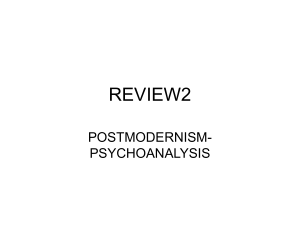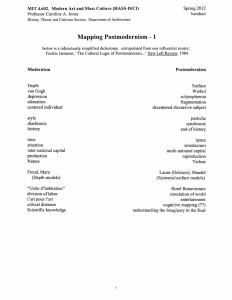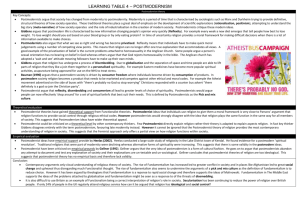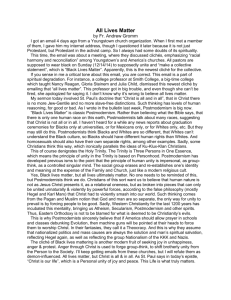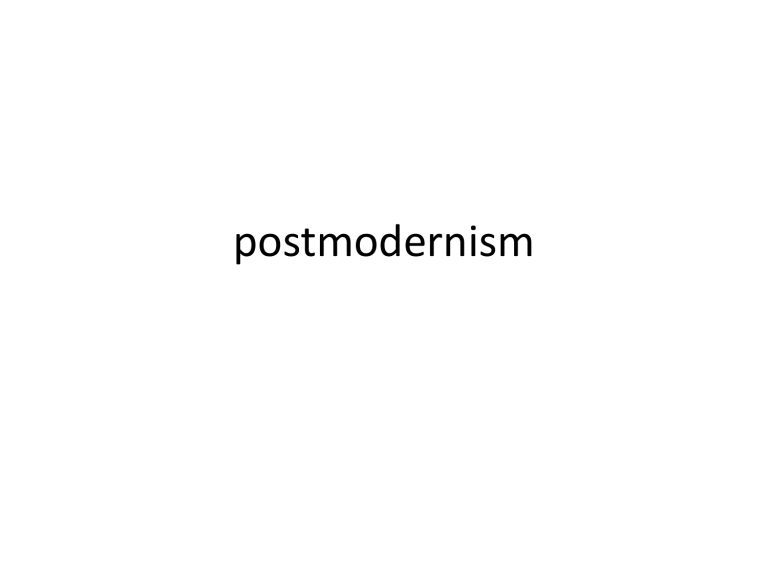
postmodernism How did postmodernism emerge? • Premodernism: Before the 1600s, people in the West generally believed that God (or the transcendent/supernatural realm) furnished the basis for moral absolutes, rationality, human dignity, and truth. • This is expressed by the noted Christian theologian Anselm (b. AD 1033), who said, "I believe that I may understand" (credo ut intelligam) he spoke of a "faith seeking understanding" (fides quaerens intellectum). • That is, the starting point for knowledge and wisdom was God, who provided the lens through which one could properly interpret reality and human experience. By having faith in God, the world could be rightly understood. • Modernism: Then came philosopher René Descartes (1596-1650). As a Roman Catholic, he was troubled by the philosophical skepticism and (due to the Protestant Reformation) the theological uncertainty of his day. • So he embarked on a "skeptical voyage" in the pursuit of absolutely certain knowledge. As part of his project, he determined to doubt everything: Maybe an evil genius was tinkering with his mind - or maybe everything is an illusion. • But he concluded that at least he knew he was doubting, which is a form of thinking. He concluded: I think; therefore I am (or, in Latin, cogito, ergo sum). So without realizing it, Descartes' project removed God from center stage, replacing it with the human knower as the starting point. The effect would be momentous. • The rationalism of the European Enlightenment (c. 1650-1800) reflected this shift. This period was both optimistic about human potential and reason, but was also skeptical about church authority/state churches and Christian doctrine ("dogma"). • • This was just one of many modernist projects that assumed that human dignity, truth, and reason could be preserved without God. Besides rationalism (with its emphasis on reason), there were Romanticism (with the emphasis on feeling), Marxism, Nazism, and other utopian schemes that sought to displace God as the starting point for understanding and living. • The Jewish-Christian worldview that had deeply influenced the West was now being challenged. This was just one of many modernist projects that assumed that human dignity, truth, and reason could be preserved without God. • Besides rationalism (with its emphasis on reason), there were Romanticism (with the emphasis on feeling), Marxism, Nazism, and other utopian schemes that sought to displace God as the starting point for understanding and living. The Jewish-Christian worldview that had deeply influenced the West was now being challenged. • Postmodernism: Then, in the wake of two World Wars, a postmodern climate started to permeate the West. Confidence in human progress and autonomy was shattered on the rocks of Auschwitz and the Soviet gulags. The systems or "grand stories" ("metanarratives") of Nazism, Marxism, scientism, or rationalism ended up oppressing "the other"—that is, those marginalized by these systems such as Jews, capitalists, etc. These systems proved to be total failures. • So with postmodernism, not only was God excluded as a foundation for making sense of reality and human experience; we cannot speak of any universal truth, reason, or morality. We just have fragmented perspectives. • If the French Revolution and the storming of the Bastille in Paris (1789) stands as a picture of the shift to modernism, the fall of the Berlin Wall exactly 200 years later (1989) symbolizes the failure of modernism and rise of postmodernism What is postmodernism? • French postmodernist Jean-François Lyotard famously claimed modernism's end symbolized by Auschwitz, asking, "Where, after the metanarratives, can legitimacy reside?" What is postmodernism then? "Simplifying to the extreme, I define postmodern as incredulity toward metanarratives."2That is, postmodernism is deeply skeptical about (or suspicious of) big explanatory systems or stories. • It is also critical of any view that claims to be neutral, unbiased, or rational. Christian philosopher Merold Westphal observes that modernism was characterized by the quest for – (a) absolute certainty (think of Descartes) and – (b) totalism - that all-embracing system ("metanarrative").3 • Modernists attempted to create "grand stories"-without reference to God-to ground human dignity, freedom, morality, and progress Characteristics of Postmodernism • There is no absolute truth - Postmodernists believe that the notion of truth is a contrived illusion, misused by people and special interest groups to gain power over others. • Truth and error are synonymous - Facts, postmodernists claim, are too limiting to determine anything. Changing erratically, what is fact today can be false tomorrow. • Self-conceptualization and rationalization - Traditional logic and objectivity are spurned by postmodernists. Preferring to rely on opinions rather than embrace facts, postmodernist spurn the scientific method. • Traditional authority is false and corrupt - Postmodernists speak out against the constraints of religious morals and secular authority. They wage intellectual revolution to voice their concerns about traditional establishment. • Ownership - They claim that collective ownership would most fairly administrate goods and services. • Disillusionment with modernism - Postmodernists rue the unfulfilled promises of science, technology, government, and religion • Morality is personal - Believing ethics to be relative, postmodernists subject morality to personal opinion. They define morality as each person’s private code of ethics without the need to follow traditional values and rules. • Globalization – Many postmodernists claim that national boundaries are a hindrance to human communication. Nationalism, they believe, causes wars. Therefore, postmodernists often propose internationalism and uniting separate countries. • All religions are valid - Valuing inclusive faiths, postmodernists gravitate towards New Age religion. They denounce the exclusive claims of Jesus Christ as being the only way to God. • Liberal ethics - Postmodernists defend the cause of feminists and homosexuals. • Pro-environmentalism - Defending “Mother Earth,” postmodernists blame Western society for its destruction. • Postmodernists believe that the West’s claims of freedom and prosperity continue to be nothing more than empty promises and have not met the needs of humanity. • They believe that truth is relative and truth is up to each individual to determine for himself. • Most believe nationalism builds walls, makes enemies, and destroys “Mother Earth," while capitalism creates a “have and have not” society, and religion causes moral friction and division among people. • They challenge the core religious and capitalistic values of the Western world and seek change for a new age of liberty within a global community. • Many prefer to live under a global, nonpolitical government without tribal or national boundaries and one that is sensitive to the socioeconomic equality for all people Postmodernism – Right and Wrong? • Postmodernists do not attempt to refine their thoughts about what is right or wrong, true or false, good or evil. They believe that there isn’t such a thing as absolute truth. • A postmodernist views the world outside of themselves as being in error, that is, other people’s truth becomes indistinguishable from error. Therefore, no one has the authority to define truth or impose upon others his idea of moral right and wrong. • Their self-rationalization of the universe and world around them pits themselves against divine revelation versus moral relativism. Many choose to believe in naturalism and evolution rather than God and creationism Postmodernism – Politics • Postmodernists protest Western society’s suppression of equal rights. They believe that the capitalistic economic system lacks equal distribution of goods and salary. • While the few rich prosper, the mass populace becomes impoverished. • Postmodernists view democratic constitutions as flawed in substance, impossible to uphold, and unfair in principle

